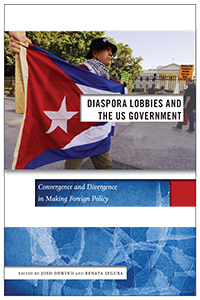Copresented with the Center for Advanced Study in the Behavioral Sciences at Stanford University (CASBS), “The City: 2014 Behavioral and Social Science Summit,” to be held November 8 on the Stanford campus, will convene leading researchers in conversation, contestation, and debate with commentators, policymakers, and thinkers. The program features moderated dialogues on “Cities and the Life Course,” “Entrepreneurship and the City,” “Global Cities” (with board member Ed Glaeser), “Sustainable Cities,” and “The Unequal City and Social Unity.” President Ira Katznelson
and board member Margaret Levi, director of CASBS, will lead the wrap-up discussion. [Register to attend, with a 20 percent discount code: CASBS14SSRC.]
The Decent City initiative has added new content to The Cities Papers, a digital collection of thought pieces produced by scholars and practitioners who have participated in several gatherings to shape the initiative’s agenda. Addressing the collection’s central question, “How can the core characteristics of big cities be mobilized to make human life more just and democratic?,” the latest papers were prepared for a major conference held in May.
Two new SSRC Working Papers are available for PDF download: from the Drugs, Security and Democracy Program series on research security, “Data Security in Highly Violent Settings,” by series editor Enrique Desmond Arias; and from the Conflict Prevention and Peace Forum
series on women in politics, “Women’s Political Participation in Asia and the Pacific,” a comprehensive study by Jacqui True, Nicole George, Sara Niner, and Swati Parashar.
A downloadable report from Measure of America and Opportunity Nation, Connecting Youth and Strengthening Communities: The Data Behind Civic Engagement and Economic Opportunity, finds that two forms of civic engagement in particular—volunteering and membership in a civic or service organization—are significant predictors of economic opportunity across US states. A previous joint publication, Historical Report of Opportunity, was cited by the Washington Post in an article about US migration patterns.
In the latest SSRC Research Snapshot, “Weekends in the Clover: Imagining Colonial New South Wales,” International Dissertation Research Fellowship fellow Maura Capps (2013) writes about her research examining the role of grasses in the British Empire’s colonial settlements in Australia.
Drugs, Security and Democracy fellow Thomas Grisaffi (2013) discusses his research on social and economic policy surrounding coca leaf production in Chapare Province, Bolivia, in a DSD On the Line
podcast. He applied his findings with Zoe Pearson, another DSD fellow from the same cohort, in a coauthored piece for Foreign Policy in Focus: “Washington Snubs Bolivia on Drug Policy Reform, Again.”
A number of Abe Fellowship Program alumni drew on their own fellowship work for recent articles. Philip Cunningham (2013) contributed a New York Times op-ed about the Chinese government’s promotion of anti-Japanese entertainment: “China’s TV War Machine.” Jennifer Robertson
(2010) published “Human Rights vs. Robot Rights: Forecasts from Japan” in Critical Asian Studies. And Nancy Snow (2012) wrote for the Diplomat on “9 Ways Japan Can Better Tell Its Story to the World.”
African Peacebuilding Network grantees Kenneth Omeje and Nicodemus Minde (2013) coauthored an article in the Africa Peace and Conflict Journal based on their APN-supported research: “Stakeholder Perspectives on Priorities for Postconflict State Building and Peace Building in South Sudan.”
New York Times columnist Frank Bruni cited the Education Research Program’s new book Aspiring Adults Adrift in an op-ed on the political and social mission of higher education.
Measure of America’s 2011 human development report A Portrait of California provided context for the CNBC article “Microsoft CEO Apologizes for Gender Pay Gap Comments.” The 2014–15 edition of A Portrait of California will be released in December.
The Huffington Post probed the Program on Religion and the Public Sphere’s digital project The Religious Engagements of American Undergraduates for a story about spiritual life on campus.
Science magazine applauded Vietnam’s successful helmet campaign, a topic covered in depth in the Vietnam Program report Helmet Day! Lessons Learned on Vietnam’s Road to Healthy Behavior.
The InterAsia Program, in conjunction with its Transregional Virtual Research Institute partners, held an international conference on “Media as Activism” in New Delhi, India.
The Digital Culture program and the British Academy cosponsored a London forum on “The Challenges of Digital Culture,” which sought to address issues arising from debate in many countries about open-access publishing and its implications for research.
The Conflict Prevention and Peace Forum’s Justice and Security Research Program cohosted a presentation at The Hague on responses to sexual violence in the Democratic Republic of the Congo, as part of a Wageningen UR conference on “Facing Fragilities: People, Aid and Institutions in Socio-economic Recovery.”
The African Peacebuilding Network, supporting independent African research and its integration into regional and global policy communities, awarded a range of grants and fellowships to twenty-four African scholars and practitioners to support and promote high-quality, policy-relevant social science research focusing on peacebuilding in Africa.
The Next Generation Social Sciences in Africa program, strengthening tertiary education in Africa through a series of institutional and individual interventions, has forty-three new African fellows working on timely topics, including traditional peacebuilding mechanisms in northern Nigeria, food sovereignty in Tanzania, and rural livelihood patterns in post-conflict northern Uganda.




